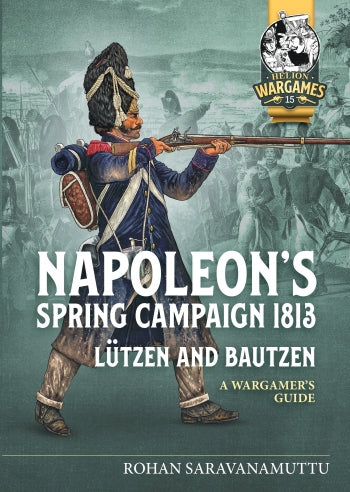Entoyment Wargaming and Hobby Centre
Napoleon's Spring Campaign: Lutzen & Bautzen
Napoleon's Spring Campaign: Lutzen & Bautzen
3 in stock
Couldn't load pickup availability
Out Of Stock!
We will notify you when this product becomes available.
The Battle of Lützen, 2 May 1813, was Napoleon’s first battle of the 1813 campaign, and was soon followed by Bautzen on 20–21 May. Both were bloody affairs in which Napoleon’s newly raised army met the Allied armies of Russia and Prussia, but they were otherwise very different. Lützen was an encounter battle, with troops committed to the fight as they arrived from various directions, and in which neither side had a clear idea of their enemy’s strength and location. Bautzen was a set piece battle, fought on ground chosen and prepared for defence by the Allies. The two contrasting battles offer fascinating challenges for wargames commanders.
The battles were not symmetrical. For example the French significantly outnumbered the Allies at Bautzen, but were weaker in cavalry. Both battles are generally deemed to have been French victories, albeit indecisive ones because Napoleon lacked the cavalry to carry out a pursuit that could turn a retreat into a rout. An analysis of the casualties however, shows that the results were not so clear cut. After these two ‘victories’, Napoleon was happy to agree to an armistice in June 1813.
A discussion of the historical battles highlights errors made by the commanders on the day. The wargame commanders will have to decide how they deploy their forces (within historical constraints), and time their use of reserves. Will they repeat the mistakes of history, or will they make their own mistakes?
This book helps teams of wargamers refight the battles on a table top with model soldiers. They can be fought as independent battles or, given the high level of commonality of the forces present, linked together in a mini-campaign.
The guide sets out the strategic and political situation in central Europe and contains a thorough but clear account of the historical battles. It provides detailed orders of battle of the opposing armies, scaled down orders of battle for game purposes, maps of the historical events, stylised maps for laying out wargames tables, and instructions for each battle and for the mini-campaign. Design notes explain the rationale and historical background to the scenario instructions.
The scenario maps are set out on square grids for ease of setting up tabletop terrain. Any set of wargames rules for the period is able to be used to play the scenarios. The key points for the game army lists are the number of units and their quality.
Given that the sides were unequal, the game victory conditions are based on a comparison with the historical results, rather than the usual outright victory or defeat.
This book is the second in a series of guides written by Rohan Saravanamuttu, the first being Leipzig, the Battle of the Nations: A Wargamer’s Guide to the Battle of Leipzig 1813, also published by Helion & Co in this series.
Share


